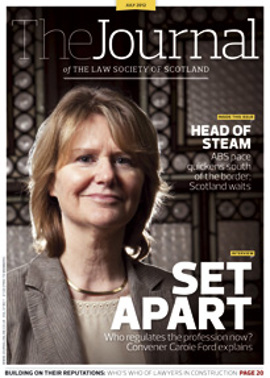Waste not
The Waste (Scotland) Regulations 2012 came into force on 17 May 2012 and will be of importance to local authorities, waste operators, waste producers, environmental agencies and all other interested parties.
The regulations have amended several key pieces of legislation:
- Environmental Protection Act 1990
- Pollution Prevention and Control (Scotland) Regulations 2000
- Landfill (Scotland) Regulations 2003
- Waste Management Licensing (Scotland) Regulations 2011.
Critically, the regulations introduce a variety of far reaching measures to deliver key actions detailed in Scotland’s Zero Waste Plan.
The Zero Waste Plan seeks a zero waste society where “resource use is minimised, valuable resources are not disposed of in landfills, and most waste is sorted into separate streams for reprocessing, leaving only limited amounts of waste to go to residual waste treatment, including energy from waste facilities”.
Central to this vision is the waste hierarchy which places the prevention of waste as a priority, with reuse, recycling and recovery following in order of preference. Disposal of waste, such as by landfill, is regarded as the least desirable option. The regulations seek to assist in achieving the aims of the waste hierarchy.
New duties
A plethora of statutory requirements have been introduced that will require compliance through separate statutory deadlines. These will have serious implications for the management of waste and will affect local authorities, the waste management sector, private businesses and households. The changes include, inter alia:
- From 1 January 2014, subject to exceptions, any person that produces “controlled waste” (defined in s 75 of the Environmental Protection Act 1990, as amended) will have a duty to take all reasonable steps to separate dry recyclable waste. This duty will apply to all “controlled waste” producers (excluding households).
- Subject to a number of exclusions, from 1 January 2014, any person that controls or manages a food business that produces “controlled waste” will have a duty to take all reasonable steps to ensure the separate collection of food waste produced by the business. Premises that produce less than 50kg of food waste per week, and hospitals, will have until 1 January 2016 to comply.
- Use of food waste disposal units and food waste digesters which involve treated non-domestic food waste being discharged into public sewers will be banned from 1 January 2016. The purpose of this requirement is to ensure that food waste is treated higher in the waste hierarchy in anaerobic digestion facilities.
- From 1 January 2014, subject to a number of exceptions, local authorities will have a duty to provide receptacles to householders to enable them to collect dry recyclable waste separately. Local authorities will also require to take reasonable steps to promote separate collection and recycling in any other manner.
- Subject to a number of exceptions, local authorities will have the duty to provide receptacles to householders for food waste collection from 1 January 2016.
- Under the amended Pollution Prevention and Control (PPC) Regulations, SEPA will have the obligation, when granting or varying permits from 1 July 2012 authorising the incineration of municipal waste, to ensure that where practicable, waste including non-ferrous metals and hard plastics should not be incinerated. The effect of this amendment is to require the further treatment of unsorted waste to remove “key recyclables”, namely non-ferrous metals or hard plastics, prior to incineration. There is no specific date for the introduction of the requirement for pre-treatment to existing incinerators. The regulations will only require this on a later application for the variation of the PPC permit.
- SEPA will have the duty to ensure that any PPC permit granted or varied from 1 January 2014 contains such conditions as it considers necessary to (1) in respect of a facility for incineration or the treatment of animal, vegetable and food matter, such as tanners and slaughterhouses, ensure that no segregated waste is mixed with other wastes where this would hamper further recycling; and (2) in respect of a permit authorising the incineration or co-incineration of waste, ensure that no separately collected waste capable of being recycled is incinerated.
- Landfill operators will be banned from accepting separately collected waste capable of being recycled from 1 January 2014, and biodegradable municipal waste from 1 January 2021.
In this issue
- On your marks
- Many's a crowd
- Family migration
- Assessing internet sex offenders
- Division and sale - disposal inter se
- Reading for pleasure
- Opinion column: Elaine Motion
- Council profile
- Book reviews
- President's column
- Into the front line
- A few more bricks
- Eye on the profession
- One eye over the border
- Who's who in construction
- Speed up child cases
- Take another look
- Relief on the review front
- Waste not
- Scottish Solicitors' Discipline Tribunal
- Financial services regulation: the race to reform
- Leases: where next?
- A wake-up call?
- Law reform roundup
- From the Brussels office
- Update: Registered Paralegal Scheme
- Business checklist
- Ask the experts
- Ask Ash






